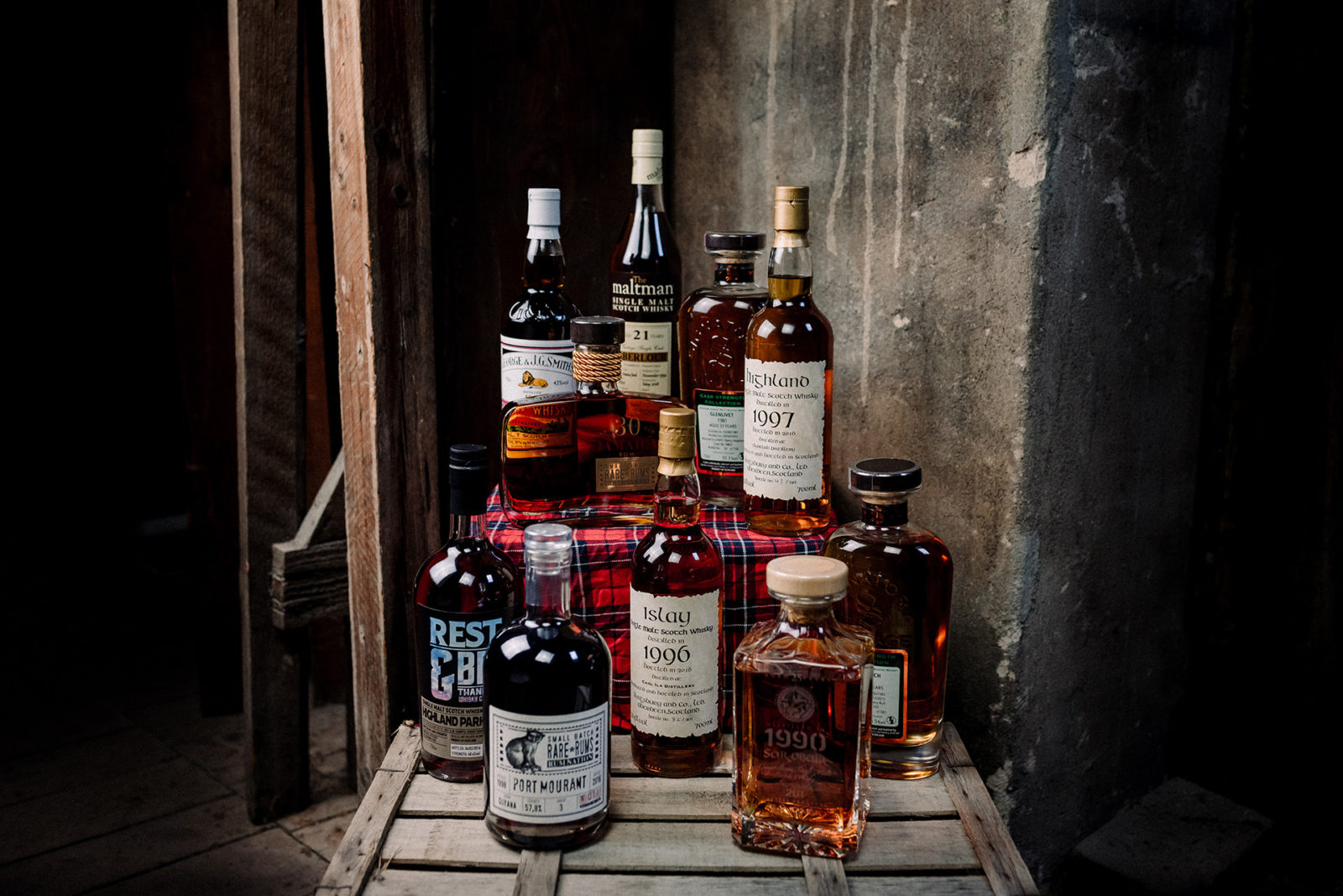Why it’s Acceptable to Get Excited by Single Cask Whisky
Independent Bottling
There has been a lot said of late regarding single cask whisky – the expected quality of such products, the actual quality of them and whether or not you are in fact getting good value for money when you purchase one has all been up for discussion.
Before we begin looking into this, it is important to state one clear fact: Not all single cask whiskies are good, but many are amazing.
It’s when you learn how to identify the good ones from the bad that this whole world of intriguing and unique expressions truly opens up to you. If you don’t, you could end up spending a whole lot of money on something that really isn’t that great.
In order to learn this skill we must first understand what a single cask whisky is, its purpose, how it’s marketed and what pieces of information we should be on the look-out for (and which ones we should ignore).
Marketing Tools or Facts?
Single cask whiskies are sold as pure, unique and rare expressions, often marketed as being purer and more honest examples of a distillery’s spirit.
They are frequently created without the use of chill-filtration or added colouring and are often bottled at cask strength. These are some of the things retailers, bottlers and distilleries will likely harp on about when ‘pushing’ a bottle, but are these things that we should really be paying attention to or just marketing tools?
Chill filtration and colouring are almost certainly used in this way. While many people believe that they do affect the final flavour of your whisky, this is yet to be scientifically proven and as a result, we can’t really take anything from facts about the use, or lack thereof, of these things in the distilling process. If you’re buying a whisky based on this, you’re doing it wrong.
The idea behind the notion that single cask expressions are purer comes from the fact that the non-single cask single malt whiskies out there (the ones that are main stays on supermarket shelves, in pubs and whisky bars) have been ‘modified’ to fit house style and taste exactly like every other bottle with the same label.
These drams are actually made from many different casks of single malt whisky that master blenders and distillers have slaved over, making sure the maturation process has gone perfectly, and then combining these different casks to create a taste that is both pleasing on the senses but also uniform.
They work tirelessly to create whiskies that are well-rounded, full of flavour and perfectly poised, but they also strive to meet house styles.
This level of expertise is somewhat bypassed with single cask whisky.
It’s true that at the time of production, the blenders and distillers will be involved in the making of the spirit and the cask/wood selection but, beyond that, their input is limited (unless finishes are to be added at a later date).
By the definition of the word, this does indeed make single cask whiskies purer, but it doesn’t necessarily make them better.
It would be misguided to suggest that the flavour profiles found in single casks whiskies are unequivocally more sophisticated than those made up of multiple casks of single malt (they can be but it’s certainly not a rule). What these whiskies do offer though is the chance to taste a distillery’s spirit in a number of different ways.
Unlike the ‘manufactured’ flavours in most normal bottlings, single cask whiskies will be affected by just four things: the quality of the distillery’s new-make spirit, the quality and type of wood it is matured in, the length of time for which it is matured and the strength at which it is bottled.
With these variables differing greatly from cask to cask, you have the opportunity to taste types of whisky that you otherwise would never get your hands on. A peated Macallan perhaps? Or maybe a Laphroaig matured in a rum cask?
These are just a couple of the endless varieties of expression available in the single cask world. They do all have one thing in common though – none of them really fit with the distilleries’ house style, and for that we are happy.
What else does a single cask offer?
On top of granting access to a wider range of expressions from each of Scotland’s distilleries, single cask whiskies can also offer significant investment value. With releases limited to around 500 bottles (at the very most), these whiskies are relatively rare from the get-go.
As they sell, get poured out and sipped on, they become rarer and rarer by the dram. If you’re willing to hold on to yours for years rather than enjoying the spirit inside, you could stand to make a healthy profit down the line.
For collectors and whisky experts alike, they can also act as a kind of historical archive.
Each bottle is stamped with information on what year it was distilled and when it was bottled. As a result, they work excellently as a kind of ‘whisky looking-glass’, through which you can peer into a distillery’s processes from a particular era.
This is obviously interesting for the avid whisky drinker, but also incredibly useful for learning and improving distilling processes and keeping a detailed account of whisky history and lore.
Buying a good one
It’s evident that many single cask whiskies have a lot going for them and a lot to offer the buyer, but these benefits can only really be redeemed if the buyer knows what they are looking for.
There are literally thousands of expressions out there and they all say similar things on the bottle, so picking a good one can be a daunting task, but there is actually a pretty easy way to ensure the whisky you get is of good quality.
Independent bottlers are responsible for releasing the vast majority of single cask whiskies. Some apply finishes to the casks they select but most opt to leave them as is and then bottle straight from the cask.
In order to pick a good expression, you should first seek out the best bottlers. Gordon & MacPhail, Signatory Vintage, Hunter Laing and Douglas Laing are four of the biggest in Scotland. Each one of them is known for having a stringent cask selection process and an incredible knowledge of whisky production and maturation.
If you’re looking for a good quality single cask expression, it’s never a bad idea to start with one of these companies (or a similarly well-regarded bottler).
The folks working at these bottlers, much like the master distillers and blenders at distilleries, have worked incredibly hard to gain an in-depth knowledge of cask selection and the procedures involved. They will taste huge number of casks, often into the hundreds, before selecting one that is right for them.
It is here that the experts get to have their input, and it could be said that this makes up for the fact that the casks have received little attention since being produced.
In conclusion
It’s more than acceptable to get at least a little excited by the growing world of single cask expressions.
This branch of the whisky industry allows drinkers to try expressions that they would not otherwise have been able to get their hands on and they offer the opportunity to get a flavour of a distillery’s new-make spirit, without any modifications or ‘invented’ flavour compounds.
As I stated earlier, not all single cask whiskies can be great (even though they may be marketed as that), but as long as you have a decent knowledge of bottlers and are well aware that a whisky being made without chill filtration and added colouring is not necessarily better than one made with those things, you’re not really about to get duped.
The indie bottlers and retailers out there are obviously trying to sell you whisky, much in the same way distilleries do with their official bottlings, but I have found that the full force of their marketing teams usually comes into play when telling the back story of an expression (rather than with the facts on the bottle).
In my opinion, they are correct to state that these expressions are purer, and they are completely right to make note of things like limited bottle numbers and the lack of chill filtration and added colouring. It would be more of a worry if they weren’t telling you these things. Yes, they are facts that help to sell a whisky, but it would be outlandish to suggest they are marketing tools and marketing tools alone.
In fact, they are very useful pieces of information that allow the consumer to make a more informed decision when buying a bottle. As long as said consumer is aware that these things don’t necessarily make a whisky great (which we hopefully all are by this point) then they’ll get on just fine.
The world of single cask whiskies is one that has a great number of incredible expressions on offer and each and every one is different than the last. For avid whisky drinkers it’s a place to further expand their knowledge and learn about distillery processes, and for collectors and investors, it’s a paradise.



